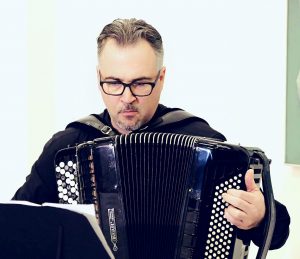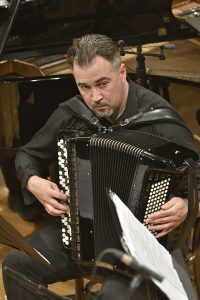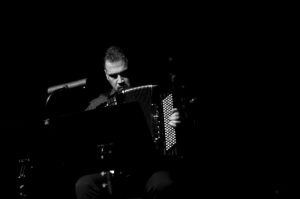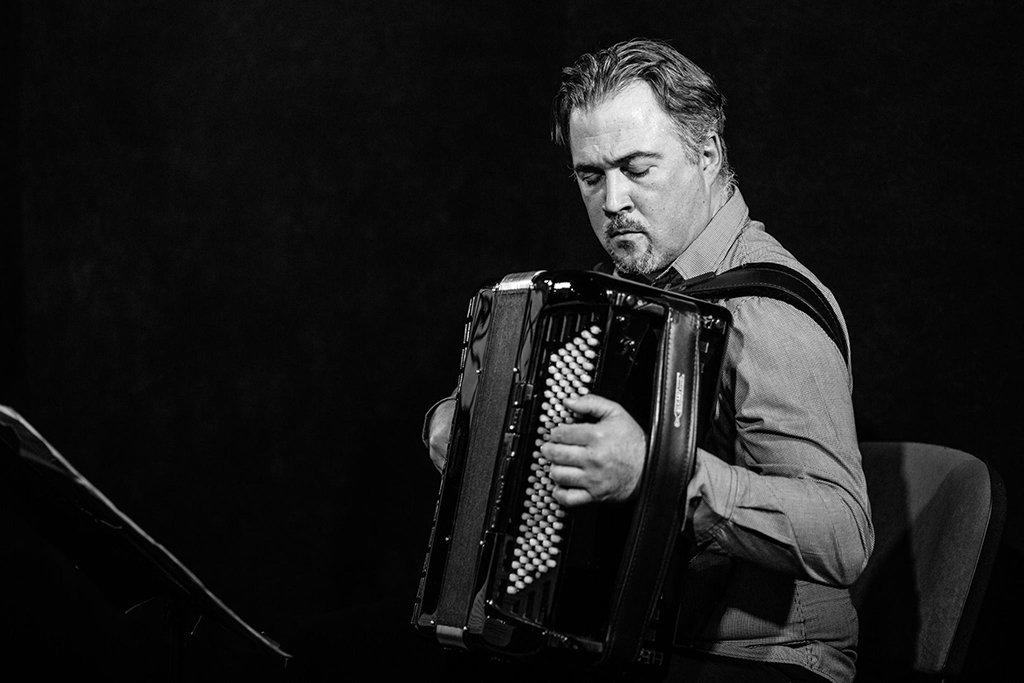 Vladimir Blagojević, classe 1980, dopo aver studiato nel suo paese natale, Kragujevac (Serbia), con i professori Slobodan Stanić e Vojin Vasović, si è laureato nel 2004 e ha conseguito il master nel 2007 presso la Hochschule der Künste di Berna (Svizzera), sotto la guida del Prof. Teodoro Anzellotti. Vincitore di numerosi concorsi internazionali e rinomato concertista in ambito solistico e da camera, Vladimir è un membro permanente dell’ensemble “Pre-Art” di Zurigo e dell’ensemble “Studio6” di Belgrado. La sua creatività è evidente nelle collaborazioni con numerosi compositori nella realizzazione di nuovi brani per fisarmonica solista e da camera, dei quali ha eseguito più di cento prime esecuzioni. Attualmente, Vladimir è un insegnante di fisarmonica presso l’Accademia Musicale di Kragujevac dove ricopre la carica di Capo del Dipartimento. Disponibile e amichevole fin dai nostri primi contatti, è con piacere che vi lascio all’intervista che vi permetterà di conoscerlo meglio.
Vladimir Blagojević, classe 1980, dopo aver studiato nel suo paese natale, Kragujevac (Serbia), con i professori Slobodan Stanić e Vojin Vasović, si è laureato nel 2004 e ha conseguito il master nel 2007 presso la Hochschule der Künste di Berna (Svizzera), sotto la guida del Prof. Teodoro Anzellotti. Vincitore di numerosi concorsi internazionali e rinomato concertista in ambito solistico e da camera, Vladimir è un membro permanente dell’ensemble “Pre-Art” di Zurigo e dell’ensemble “Studio6” di Belgrado. La sua creatività è evidente nelle collaborazioni con numerosi compositori nella realizzazione di nuovi brani per fisarmonica solista e da camera, dei quali ha eseguito più di cento prime esecuzioni. Attualmente, Vladimir è un insegnante di fisarmonica presso l’Accademia Musicale di Kragujevac dove ricopre la carica di Capo del Dipartimento. Disponibile e amichevole fin dai nostri primi contatti, è con piacere che vi lascio all’intervista che vi permetterà di conoscerlo meglio.
Hai iniziato a studiare musica da piccolo, fin dalla scuola elementare. Cosa ti ha spinto a scegliere la fisarmonica? È stato il primo strumento a cui ti sei approcciato o hai cominciato con altro?
Innanzitutto grazie mille per l’invito, è un grande onore per me, che, dopo due decenni, la vostra rivista scriva di nuovo di me e delle mie attività. In quell’occasione, ero presente come vincitore del Premio a Castelfidardo. Il desiderio di suonare la fisarmonica è nato soprattutto dalla grande popolarità della musica folk che all’epoca era estremamente diffusa nella regione balcanica. Ho iniziato a suonare la fisarmonica fin dall’inizio, quella con i bottoni, quindi non ci sono stati molti cambiamenti durante la mia formazione musicale.
Quando hai iniziato a studiare i bassi sciolti e quale modello di fisarmonica suoni?
Ho iniziato a suonare i bassi sciolti all’età di tredici anni, quindi meno di cinque anni dopo aver iniziato a studiare la fisarmonica. Come fisarmonica, suono la Bugari Armando e posso dire che, a mio modesto parere, la loro tecnologia è la più avanzata sul mercato degli strumenti oggi.
Dopo le scuole superiori, hai studiato all’Università delle Arti di Berna sotto la guida del M° Teodoro Anzellotti, trasferendoti in Svizzera. Cosa ti ha portato a scegliere questa meta e com’è stato ritornare in Serbia?
È stata una decisione piuttosto difficile perché lasciare un Paese così avanzato comporta nuove sfide, una delle quali era un nuovo lavoro presso l’Accademia musicale della mia città natale, Kragujevac. Sono felice, però, di aver mantenuto tutti i miei contatti nella nazione in cui ho studiato e collaboro ancora attivamente con musicisti e compositori svizzeri e anche di altri Paesi dell’Europa occidentale. Andare a studiare con il Maestro Teodoro Anzellotti è stata la migliore decisione della mia vita. La sua enorme esperienza nel lavorare con diversi musicisti, ensemble, compositori e direttori d’orchestra vale oro. Ho avuto l’opportunità di fare una grande esperienza e di imparare dai migliori. Questo mi ha aiutato a crescere sia come persona che come artista.
Durante la tua carriera, hai vinto numerosi concorsi internazionali importanti, come il “Premio Internazionale della Fisarmonica” di Castelfidardo, la “Coupe Mondiale” e altri. Quanta importanza ha avuto ottenere un riconoscimento in queste manifestazioni? Pensi che abbiano segnato il tuo futuro professionale?
Vincere i concorsi è di grande importanza, non solo per la vittoria in sé, ma anche per la partecipazione stessa perché si acquisisce una grande esperienza e s’incontrano persone diverse, si creano nuove relazioni. Sicuramente, tutto ciò ha influenzato il prosieguo della mia carriera in modo estremamente positivo. Si sono aperte molte porte e, quindi, nuove conoscenze e nuovi contatti, ma qui è necessario sottolineare che la competizione è soprattutto un mezzo e non un obiettivo. Un mezzo per migliorare le capacità musicali e un percorso verso un palcoscenico aperto di musicisti che si esibiranno su diversi podi senza la necessità di confrontarsi con gli altri.
Attualmente, sei docente di fisarmonica presso l’Accademia di musica di Kragujevac, in Serbia, dove ricopri la carica di Capo del Dipartimento. Ci sono stati cambiamenti nel ruolo che occupa la fisarmonica, sia sul piano didattico che sociale, da quando eri tu studente a oggi?
È vero, ma nel frattempo sono a capo dell’intero dipartimento di musica, non solo di quello di fisarmonica. È un lavoro importante che richiede molto tempo e che purtroppo ha un impatto sulle attività artistiche. Non lo considero un fenomeno negativo poiché penso che tutti debbano essere coinvolti in questioni organizzative relative alla propria professione; al giorno d’oggi, e alla velocità con cui viviamo, è semplicemente necessario.
Ci sono sicuramente dei cambiamenti rispetto al periodo in cui studiavo io. Innanzitutto, per quanto riguarda la letteratura, essa sta progredendo, si sta sviluppando, sta vivendo dei cambiamenti, si sta evolvendo, e questo è un fenomeno positivo in sé. Mi sembra che i giovani di oggi abbiano un livello di rendimento più alto rispetto alla generazione precedente, il che è anche normale, ed è nostro dovere fare in modo che continui. L’aspetto negativo è che c’è molta competizione e gli studenti devono lottare individualmente per il proprio posto, il che richiede grandi capacità di autogestione.
 Sei un membro permanente dell’ensemble dell’associazione “Pre-Art” di Zurigo, fondata nel 2001. In che anno sei entrato a farne parte? Qual è il vostro progetto?
Sei un membro permanente dell’ensemble dell’associazione “Pre-Art” di Zurigo, fondata nel 2001. In che anno sei entrato a farne parte? Qual è il vostro progetto?
Proprio così, sono uno dei fondatori di “Pre-Art”. È un grande onore e piacere lavorare insieme da oltre vent’anni, suonare insieme in tutto il mondo, ricevere nuove composizioni, commissionare nuovi lavori e avvicinarsi alla musica con la stessa intensità e gioia di prima. Sono particolarmente felice che la fisarmonica abbia trovato il suo posto unico in questo ensemble, non solo in esso ma in molti ensemble in tutta Europa, dopo molti anni di estenuanti lotte. Mi sembra che il nostro strumento abbia finalmente trovato il posto che gli spetta come partecipante alla vita musicale.
Come cofondatore di “Studio6 – Contemporary Music Collective”, ensemble composto da artisti di spicco provenienti da tutta la Serbia, la cui attività si concentra sull’esecuzione di musica d’arte contemporanea, che tipo di attività svolgi?
Dopo il mio ritorno in Serbia, avevo il desiderio di promuovere la musica artistica contemporanea, con un approccio alternativo alla musica e al pensiero, e l’avanguardia. Questo era il mio obiettivo principale e sono stato fortunato che diversi giovani colleghi la pensassero allo stesso modo; è così che è nato l’ensemble “Studio6”. Quest’anno abbiamo festeggiato il nostro decimo anniversario e ne sono veramente felice. Ci siamo esibiti non solo in Serbia, ma anche in molti Paesi come Gran Bretagna, Svizzera, Croazia, ecc. Ci occupiamo anche della parte didattica, tenendo masterclass, seminari…
Hai lavorato insieme a molti compositori dal calibro di Matthias Pintscher, Pierre Boulez, Matthias Arter, Miroslav Srnka, Wolfgang Rihm, Richard Berret, Oscar Bianchi per la realizzazione di brani per fisarmonica solista e in ensemble, contribuendo così alla formazione di repertorio originale. Quanto è importante che ci sia un fisarmonicista ad affiancare il compositore durante la creazione di un brano?
Come ho già accennato in una delle risposte precedenti, ritengo fenomenale il fatto che siamo arrivati alla fase in cui i più grandi nomi scrivono per il nostro strumento, frutto del lavoro pluridecennale di persone importanti del mondo della fisarmonica, i cosiddetti pionieri. È un grande onore per me continuare su questa strada. Naturalmente, la collaborazione tra strumentisti e compositori è di fondamentale importanza. Se l’autore non è un fisarmonicista, l’esecutore è a sua disposizione per fornirgli tutti i dettagli tecnici possibili. A seconda della flessibilità e dell’apertura di queste due personalità, il lavoro avrà più o meno successo.
Hai eseguito in prima assoluta una settantina di composizioni come solista o in ensemble da camera. Ti è mai capitato di avere una visione diversa del brano o di qualche sezione specifica rispetto a quella suggerita dal compositore?
Nel frattempo ce ne sono più di cento. Certo, e non solo ogni tanto, ma il più delle volte! Questo, però, riguarda la visione dell’esecutore, non la percezione dell’opera nella sua essenza, che è naturalmente il mondo intimo dell’autore, e come esecutori non dovremmo interferire in questo. Ha a che fare con la risposta precedente alla tua domanda: per lo più i compositori sono quelli che non hanno avuto contatto con il nostro strumento, e in quel caso è necessario sottolineare alcuni dettagli affinché la loro idea possa essere espressa ancora di più.
Hai tenuto numerosi seminari e conferenze nel tuo paese e all’estero sul tema della fisarmonica nella musica contemporanea e del ruolo dell’interprete in essa. Quali consigli dai ai tuoi studenti e quali daresti ai giovani che intraprendono lo studio professionale della fisarmonica?
Il mio consiglio è estremamente semplice. Essere sé stessi e solo sé stessi, cercare di trovare un modo individuale per affrontare ciò che interessa veramente e non ciò che l’ambiente impone. Un altro consiglio è quello di lavorare in modo che il grande pubblico senta e veda ciò che realmente fanno. L’era dei mass media e dei social network di oggi richiede la necessità di un’elevata capacità di autogestione, come ho già detto. Il percorso per arrivare ai vertici della mia generazione mi sembra sia stato molto più facile di quello attuale. Per questo sono necessarie molte rinunce, molto lavoro e fiducia in sé stessi.
 Il tuo mondo è prevalentemente legato alla musica contemporanea e alle nuove composizioni. Cosa ne pensi delle trascrizioni barocche e, più in generale, del repertorio che non nasce per fisarmonica suonato durante il percorso accademico e in concerto?
Il tuo mondo è prevalentemente legato alla musica contemporanea e alle nuove composizioni. Cosa ne pensi delle trascrizioni barocche e, più in generale, del repertorio che non nasce per fisarmonica suonato durante il percorso accademico e in concerto?
Pur ritenendo assolutamente necessario occuparsi della letteratura originale scritta per il nostro strumento, condivido pienamente l’affermazione secondo cui è necessario occuparsi della trascrizione e delle opere di tutte le epoche precedenti. Ha molteplici significati, da quello didattico a quello stilistico, fino a una migliore percezione della musica contemporanea stessa. Non ho mai smesso di suonare le trascrizioni, anche se forse non è così visibile considerando le mie attività degli anni precedenti. Sto certamente progettando diverse edizioni di trascrizioni di letteratura barocca e classica. Naturalmente, la questione più importante è come eseguire la trascrizione, ma si tratta di un grande tema in particolare, che necessiterebbe di un’altra intervista perché la questione è molto delicata.
Che nuovi progetti ci sono nel tuo futuro? Ce n’è qualcuno che ti porterà in Italia?
Per l’anno prossimo sono previsti molti progetti, diverse esibizioni solistiche con orchestra o orchestra d’archi, diverse prime esecuzioni di musica solistica e da camera. Sarò in Serbia, Bosnia, Svizzera, Germania… inoltre, negli ultimi anni, mi sono spostato dietro il banco quando si tratta di concorsi, tanto che sarò membro della giuria di diversi concorsi prestigiosi.
Vi svelo un piccolo segreto: l’Italia è il mio Paese preferito! Una combinazione di mentalità fantastica, clima mediterraneo, storia fenomenale, cultura, architettura e gastronomia, che fa sentire ogni persona eccezionale tutte le volte che si trova lì! Ho svolto diversi progetti, principalmente pedagogici, in Italia, tenendo masterclass e in giurie. Per ora, non c’è nulla di programmato, ma mi piacerebbe molto ampliare le mie attività nel vostro bellissimo Paese, poiché sento una grande vicinanza sia culturale che intellettuale.
Un caro saluto a tutti i vostri lettori e grazie ancora per l’invito.
————————————————————————————
Being Yourself
Interview with Vladimir Blagojević
 Vladimir Blagojević, born in 1980, after studying in his home town of Kragujevac (Serbia) with professors Slobodan Stanić and Vojin Vasović, graduated in 2004 and received his master’s degree in 2007 from the Hochschule der Künste in Bern (Switzerland), under the guidance of Prof. Teodoro Anzellotti. Winner of numerous international competitions and a renowned solo and chamber musician, Vladimir is a permanent member of the “Pre-Art” ensemble in Zurich and the “Studio6” ensemble in Belgrade. His creativity is evident in his collaborations with many composers to create new pieces for solo and chamber accordion, of which he has performed more than one hundred premieres. Currently, Vladimir is an accordion teacher at the Kragujevac Music Academy where he is also Head of Department. Kind and friendly since our first contacts, it is with pleasure that I leave you with the interview that will get to know him better.
Vladimir Blagojević, born in 1980, after studying in his home town of Kragujevac (Serbia) with professors Slobodan Stanić and Vojin Vasović, graduated in 2004 and received his master’s degree in 2007 from the Hochschule der Künste in Bern (Switzerland), under the guidance of Prof. Teodoro Anzellotti. Winner of numerous international competitions and a renowned solo and chamber musician, Vladimir is a permanent member of the “Pre-Art” ensemble in Zurich and the “Studio6” ensemble in Belgrade. His creativity is evident in his collaborations with many composers to create new pieces for solo and chamber accordion, of which he has performed more than one hundred premieres. Currently, Vladimir is an accordion teacher at the Kragujevac Music Academy where he is also Head of Department. Kind and friendly since our first contacts, it is with pleasure that I leave you with the interview that will get to know him better.
You started studying music as a child, right from primary school. What made you choose the accordion? Was it the first instrument you approached or did you start with something else?
First of all, thank you very much for the invitation, it is a great honor for me that after two decades your magazine is again writing about me and my activities. Also than, I was there as a winner of Premio in Castelfidardo. The desire to play the accordion stemmed primarily from the great popularity of folk music, which was extremely popular in the Balkan region at that time. I started playing the accordion from the beginning, and the one with buttons, so there were not many changes during my musical education.
When did you start studying free basses and which accordion model do you play?
I started with free basses when I was thirteen years old, so less than five years after I started learning the accordion. I play the Bugari Armando accordion, and I can say that their technology is the most advanced on the instrument market today in my humble opinion.
After high school, you studied at the University of the Arts in Berne under Maestro Teodoro Anzellotti, moving to Switzerland. What made you choose this destination and what was it like to return to Serbia?
It was a rather difficult decision because leaving such an advanced country brings new challenges, one of those challenges was a new job at the music academy in my hometown Kragujevac. But I’m glad that I kept all my contacts from the country where I studied and I still actively collaborate with musicians and composers from there and also other countries of Western Europe. Going to study with Maestro Teodoro Anzellotti was the best decision of my life. His enormous experience in working with different musicians, ensables, composers, conductors is something worth its weight in gold. I had the opportunity to gain great experience and learn from the best. That helped me to develop both as a person and as an artist.
During your career, you won many important international competitions, such as the “Premio Internazionale della Fisarmonica” in Castelfidardo, the “Coupe Mondiale” and others. Winning an award at these events was important for you? Do you think they marked somehow your professional future?
The one to win the competition is of great importance, not only the victory but also the participation itself, because the one gains great experience and meets different people, new contacts are highlighted. It certainly influenced the further course of my career in an extremely positive way. Many doors have opened, and thus new acquaintances and new contacts. But here it is necessary to point out that competition is primarily a means and not a goal. A means to improve musical skills and a path to an open stage of musicians who will perform on different podiums without the necessity to compare with others.
You are currently a professor of accordion at the Academy of Music in Kragujevac, Serbia, where you are the head of the department. Have there been any changes in the role of the accordion, both didactically and socially, from when you were a student to today?
That is right, but in the meantime I am currently the head of whole music department, not only for accordion. It is a big job, it takes a lot of time and unfortunately it has little impact on artistic activities. But I don’t consider it a negative phenomenon, I think that everyone must be involved in organizational affairs around their profession in today’s time and at the speed with which we live, it is simply necessary.
There are definitely changes compared to the time when I was studying. First of all, in terms of literature, it is progressing, developing, experiencing its changes, evolving. and that is a positive phenomenon on its end. It seems to me that young people today are at a higher level of performance than the previous generation, which is also normal, and it is our duty to make sure that it continues. What might be negative is that there is a lot of competition and students individually have to fight for their place, which requires great skills in self-management.
 You are a permanent member of the “Pre-Art” ensemble in Zurich, founded in 2001. When did you join it? What is your project?
You are a permanent member of the “Pre-Art” ensemble in Zurich, founded in 2001. When did you join it? What is your project?
That’s right. I’m one of the founders of “Pre-Art”. It is a great honor and pleasure that we have been working together for over twenty years, playing together all over the world, receiving new compositions, commissioning new works and approaching music with the same intensity and joy as before. I am especially glad that the accordion has found its unique place in this ensemble, not only in it but in many ensembles across Europe after many years of exhausting struggle. It seems to me that our instrument has finally found the place it deserves as an equal participant in musical life.
As a co-founder of “Studio6 – Contemporary Music Collective”, an ensemble composed of prominent artists from all over Serbia, whose activity focuses on the performance of contemporary art music, what kind of activity do you carry out?
After I returned to Serbia, the desire to promote contemporary artistic music, an alternative approach to music and thought, and avant-garde was my main goal. I was lucky that several young colleagues thought the same, so that’s how ensemble “Studio6” was born. And I’m very glad that we celebrated our 10th anniversary this year. We performed not only in Serbia but also in many countries such as Great Britain, Switzerland, Croatia etc. We also deal with the educational part by holding teaching masterclass, seminars…
You have worked together with many composers of the calibre of Matthias Pintscher, Pierre Boulez, Matthias Arter, Miroslav Srnka, Wolfgang Rihm, Richard Berret, Oscar Bianchi, on pieces for solo accordion and in ensemble, thus contributing to the formation of original repertoire. How important is it that there is an accordionist to guide the composer during the creation of a piece?
As I already mentioned in one of the previous answers, I think it is phenomenal that we have reached the stage where the biggest names are writing for our instrument, it is the fruit multi-decade work of important people from the world of the accordion, the so-called pioneers. It is a great honor for me to continue on that path.
Of course, the cooperation between instrumentalists and composers is of crucial importance. if the author is not an accordionist, the performer is there to tell him all possible technical details. Depending on the flexibility and openness of these two personalities, the work will be more or less successful.
You have premiered some 70 compositions, either as a soloist or in chamber ensembles. Have you ever had a different vision of the piece or of any specific section than that suggested by the composer?
Meanwhile there are more than a hundred of them. Of course, and not only sometimes, but mostly! But this is about the performer’s vision, not the perception of the work in its essence, that is of course the intimate world of the author, and as performers we should not interfere in that. It has to do with the previous answer to your question, mostly the composers are those who have not had contact with our instrument, and in that case it is necessary to point out certain details so that their idea can be expressed even more!
You have held numerous seminars and conferences in your country and abroad on the subject of the accordion in contemporary music and the role of the performer in it. What advice do you give to your students and what advice would you give to young people embarking on the professional study of the accordion?
My advice is extremely simple. To be themselves and only themselves, to try to find an individual way to deal with what really interests them and not what their environment impose. Another piece of advice is to work so that the general public hears and sees what they actually do. Today’s age of mass media and social networks requires the necessity of high self-management skills, as I mentioned earlier. The path to the top of my generation seems to me to have been much easier than it is today. That is why a lot of renunciation, a lot of work and faith in yourself are necessary.
 Your world is mainly related to contemporary music and new compositions. What do you think of baroque transcriptions and, more generally, of repertoire that was not written for accordion played during the academic courses and concerts?
Your world is mainly related to contemporary music and new compositions. What do you think of baroque transcriptions and, more generally, of repertoire that was not written for accordion played during the academic courses and concerts?
Although I think it absolutely necessary to deal with original literature written for our instrument, I fully support the claim that it is necessary to deal with the transcription and the works of all previous epochs. It has multiple meanings starting from educational to stylistic and up to a better perception of contemporary music it self, actually. I never stopped playing transcriptions either, although it may not be so visible considering my activities in previous years. I am certainly planning several editions of transcriptions of primarily baroque and classic literature. Of course, the biggest question here is how to perform the transcription, but it is a big thema in particular, a whole other interview is needed because the question is very sensitive.
What new projects are there in your future? Are there any that will take you to Italy?
Many projects are planned for the coming year, several solo performances with orchestra or string orchestra, several premier performances of both solo and chamber music. In Serbia, Bosnia, Switzerland, Germany… also in the last years I have moved behind the counter when it comes to competitions so that I will be a member of the jury for several prestigious competitions.
I’ll tell a little secret – Italy is my favorite country! A combination of fantastic mentality, mediterranean climate, phenomenal history, culture, architecture and gastronomy it makes one feel fantastic every time they are there! I had several primarily pedagogical projects in Italy holding masterclasses and jury work. For now, nothing is planned, but I would like so much to expand my activities in your beautiful country, since I feel a great closeness both culturally and mentally.
A big greeting to all your readers and thank you once again for the invitation.

